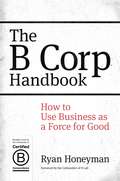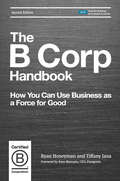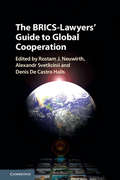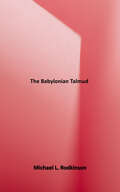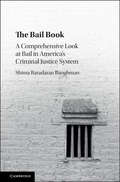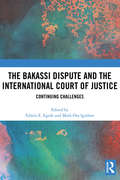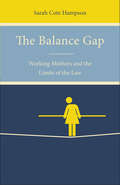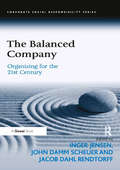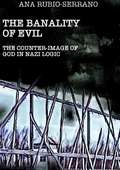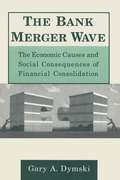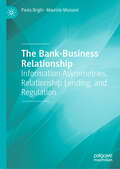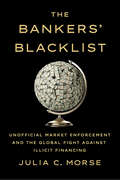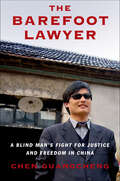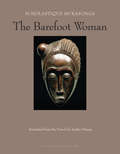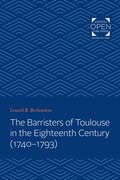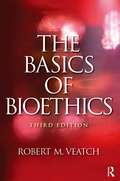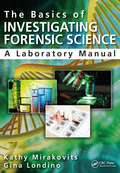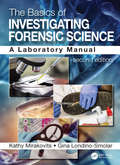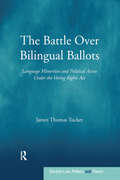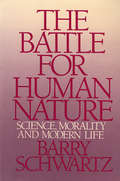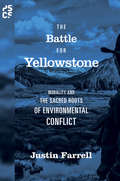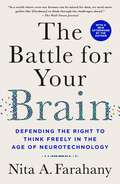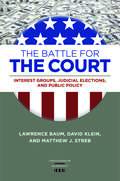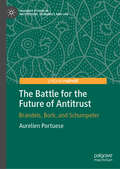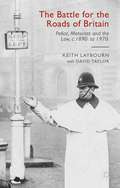- Table View
- List View
The B Corp Handbook
by Bart Houlahan Jay Coen Gilbert Andrew Kassoy Ryan HoneymanJoin a Growing movement: Learn how you can join a fast-growing global movement to redefine success in business--led by well-known icons like Patagonia and Ben & Jerry's as well as disruptive upstarts like Warby Parker and Etsy--recently covered by the New York Times, the Economist, the Wall Street Journal, Entrepreneur, and Inc. Build a better business: Drawing on best practices from 100+ B Corps, this book shows that using business as a force for good can help distinguish your company in a crowded market, attract and retain the best employees, and increase customer trust, loyalty, and evangelism for your brand. More than 1,000 companies from 80 industries and 30 countries are leading a global movement to redefine success in business. They're called B Corporations--B Corps for short--and these businesses create high-quality jobs, help build stronger communities, and restore the environment, all while generating solid financial returns. Author and B Corp owner Ryan Honeyman worked closely with over 100 B Corp CEOs and senior executives to share their tips, advice, and best-practice ideas for how to build a better business and how to meet the rigorous standards for--and enjoy the benefits of--B Corp certification. This book makes the business case for improving your social and environmental performance and offers a step-by-step "quick start guide" on how your company can join an innovative and rapidly expanding community of businesses that want to make money and make a difference.
The B Corp Handbook, Second Edition: How You Can Use Business as a Force for Good
by Ryan Honeyman Tiffany Jana"This book shows how using business as a force for good, not just pursuing short-term profits, can be better for consumers, employees, local communities, the environment, and your company's long-term bottom line."—Tony Hsieh, New York Times bestselling author of Delivering Happiness and CEO, Zappos.com, Inc. B Corps are a global movement of more than 2,700 companies in 60 countries—like Patagonia, Ben & Jerry's, Kickstarter, Danone North America, and Eileen Fisher—that are using the power of business as a force for good. B Corps have been certified to have met rigorous standards of social and environmental performance, accountability, and transparency. This book is the authoritative guide to the what, why, and how of B Corp certification.Coauthors Ryan Honeyman and Dr. Tiffany Jana spoke with the leaders of over 200 B Corps from around the world to get their insights on becoming a Certified B Corp, improving their social and environmental performance, and building a more inclusive economy. The second edition has been completely revised and updated to include a much stronger focus on diversity, equity, and inclusion (DEI). These changes are important because DEI can no longer be a side conversation—it must be a core value for any company that aspires to make money and make a difference.While this book is framed around the B Corp movement, any company, regardless of size, industry, or location, can use the tools contained here to learn how to build a better business. As the authors vividly demonstrate, using business as a force for good can help you attract and retain the best talent, distinguish your company in a crowded market, and increase trust in your brand.
The BRICS-Lawyers’ Guide to Global Cooperation
by Denis Neuwirth Rostam J. Alexandr Svetlicinii De Castro HalisIn the international trade and development arena, new and developing economies have created a block that is known as BRICS - Brazil, Russia, India, China and South Africa. Initially conceived to drive global change through economic growth, the financial crisis and reversal of fortunes of the BRICS nations have raised questions about their ability to have an impact on the governance of global affairs. This book explores the role of law in various areas of BRICS cooperation including: trade, investment, competition, intellectual property, energy, consumer protection, financial services, space exploration and legal education. It not only covers the specifics of each of the BRICS nations in the selected areas, but also offers innovative and forward-looking perspectives on the BRICS cooperation and their contribution to the reform of the global governance networks. This is a unique reference book suitable for academics, government officials, legal practitioners, business executives, researchers and students.
The Babylonian Talmud
by Michael L. RodkinsonThis is the most vital manuscript of conventional Judaism and the basic tool for learning the ethics behind its customs and regulations. The original text of the Babylonian Talmud. This English translation includes: - Standards of appointing judges to the supreme court (Sanhedrin), regulations of civil and criminal cases, when is someone acquitted or accused. - Regulations regarding the high priest, when he can judge or be judged. And regulations regarding the ruler, how many wives he can have, how much property he can own, etc. - Penalties due for criminal cases, including the four kinds of death penalty prescribed and how they ought to be executed. Enumeration of those who come under the category of stoning, burning, slaying, or choking. Who is considered a murderer deserving capital punishment and who is to be exiled. - Many more interpretations from the Torah, as this is considered to be the supplementing commentary to the five books of Moses. Folk sayings from The Talmud: "Either a friend or death." "He who has been bitten by a snake is scared of a rope." "Poverty follows the poor."
The Bail Book: A Comprehensive Look at Bail in America's Criminal Justice System
by Baughman Shima BaradaranMass incarceration is one of the greatest social problems facing the United States today. America incarcerates a greater percentage of its population than any other country and is one of only two countries that requires arrested individuals to pay bail to be released from jail while awaiting trial. After arrest, the bail decision is the single most important cause of mass incarceration, yet this decision is often neglected since it is made in less than two minutes. Shima Baradaran Baughman draws on constitutional rights and new empirical research to show how we can reform bail in America. Tracing the history of bail, she demonstrates how it has become an oppressive tool of the courts that disadvantages minority and poor defendants and shows how we can reform bail to alleviate mass incarceration. By implementing these reforms, she argues, we can restore constitutional rights and release more defendants, while lowering crime rates.
The Bakassi Dispute and the International Court of Justice: Continuing Challenges
by Edwin E. Egede Mark Osa IgiehonOn the 10th of October 2002 the International Court of Justice delivered the Bakassi decision, which, amongst other things, excised the resource rich land and maritime territory of Bakassi from Nigeria and transferred its legal title to Cameroon. These two countries under the auspices of the United Nations established the mechanism of the Cameroon-Nigeria Mixed Commission to honour and implement their obligations under the ICJ decision. Over a decade after the ICJ decision this volume brings together academics and practitioners to assess the impact of this decision and the challenges and issues that have been raised in the course of its implementation. Hailed by some as a model of preventive diplomacy and a blueprint for the future, this timely assessment illuminates the difficulties in imposing such controversial decisions and considers whether this type of Mixed Commission is an adequate mechanism for implementing them.
The Balance Gap: Working Mothers and the Limits of the Law
by Sarah HampsonIn recent decades, laws and workplace policies have emerged that seek to address the "balance" between work and family. Millions of women in the U.S. take some time off when they give birth or adopt a child, making use of "family-friendly" laws and policies in order to spend time recuperating and to initiate a bond with their children. The Balance Gap traces the paths individual women take in understanding and invoking work/life balance laws and policies. Conducting in-depth interviews with women in two distinctive workplace settings—public universities and the U.S. military—Sarah Cote Hampson uncovers how women navigate the laws and the unspoken cultures of their institutions. Activists and policymakers hope that such family-friendly law and policy changes will not only increase women's participation in the workplace, but also help women experience greater workplace equality. As Hampson shows, however, these policies and women's abilities to understand and utilize them have fallen short of fully alleviating the tensions that women across the nation are still grappling with as they try to reconcile their work and family responsibilities.
The Balanced Company: Organizing for the 21st Century (Corporate Social Responsibility)
by Inger Jensen John Damm ScheuerToday’s organizations are embedded in global and local network relationships that demand more. They have to consider the importance to customers, investors and employees of being respected in wider society and behaving ethically, so it is increasingly important for companies to reflect systematically on how to balance profits with other criteria when making decisions and acting. In short, they need to learn how to become The Balanced Company. Requiring sustainability in production processes and ethical employment of the work force in suppliers' production facilities, at home and abroad, has resulted in new challenges. Strategists need to make balanced choices about long-term goals and the allocation of resources. They must analyse, understand and adjust strategies to market, political, value and technology-related changes. Communication specialists need to take the value systems and assumptions of stakeholders into consideration. Change specialists need to balance continuity and change. Meanwhile, managers make balanced decisions about control or trust; human resources design jobs to make them attractive as well as motivating, and marketers must consider what is important to consumers and stakeholders. Last but not least, leaders have to acknowledge that there are times when organizations have to be taken out of balance during change. The Balanced Company provides answers to corporately responsible and ethically driven balanced decision making. Read it to help your company and stakeholders identify what can be achieved and what to avoid, and about the processes by which values are taken into account and applied in practice.
The Banality of Evil: The Counter-Image of God in Nazi Logic
by Ana Rubio-SerranoThe aim of this book is not only to show the historical Auschwitz but the Auschwitz that has taken root in human beings: first, the inability to distinguish between good and evil; second, the obsession for reaffirming one's own identity as uniquely human and third, the impossibility of thinking about otherness. Even today, Auschwitz persists as a legacy, of which our world is both executor and heir. Auschwitz is, therefore, the starting point, but not the endpoint. This book is a study that shows the model of the anti-human that is born of Nazi anthropology, contrary to the model of man revealed by Christian anthropology. A humanistically oriented theological and philosophical examination of the "banality of evil" within the universe of the Nazi extermination camps.
The Bank Merger Wave: The Economic Causes and Social Consequences of Financial Consolidation
by Gary DymskiThis far-reaching study shows that operating efficiencies are not what are driving today's unrelenting bank merger mania. It suggests that bank mergers and consolidation may have effects that are contrary to consumer and non-financial business interests, such as lower rates of interest, increasing fees, and tighter credit constraints. Dymski recommends several new policies to apply to the evaluation of prospective mergers.
The Bank-Business Relationship: Information Asymmetries, Relationship Lending, and Regulation
by Paola Brighi Maurizio MussoniThis book investigates the factors driving the transformation of banks&’ credit function and the evolving financial requirements of corporations, with a particular focus on the dynamics of bank-business relationships. It addresses the impact of inherent market failures in the banking sector, notably information asymmetries and credit rationing, on these relationships and their influence on corporate decisions regarding funding sources. The book also examines the competitive pressure faced by firms that adopt new entrepreneurial models, necessitating innovative strategies in financial management, and evaluates the adaptive responses banks can employ to meet emerging financial needs. Additionally, it analyzes how banking regulation influences lending decisions, especially under conditions marked by information asymmetries and financial constraints. A distinctive feature of the book is its comprehensive analysis of the motivations underlying recent transformations within the banking sector. These transformations stem from both endogenous processes, such as the classification of financial and banking services as &“credence goods&” and the related regulatory implications, and exogenous factors, including regulatory reforms and the ongoing transition toward sustainability and digitalization. This book will appeal to academic scholars, practitioners, and policymakers in banking and risk management.
The Bankers' Blacklist: Unofficial Market Enforcement and the Global Fight against Illicit Financing (Cornell Studies in Money)
by Julia C. MorseIn The Banker's Blacklist, Julia C. Morse demonstrates how the Financial Action Task Force (FATF) has enlisted global banks in the effort to keep "bad money" out of the financial system, in the process drastically altering the domestic policy landscape and transforming banking worldwide.Trillions of dollars flow across borders through the banking system every day. While bank-to-bank transfers facilitate trade and investment, they also provide opportunities for criminals and terrorists to move money around the globe. To address this vulnerability, large economies work together through an international standard-setting body, the FATF, to shift laws and regulations on combating illicit financial flows. Morse examines how this international organization has achieved such impact, arguing that it relies on the power of unofficial market enforcement—a process whereby market actors punish countries that fail to meet international standards. The FATF produces a public noncomplier list, which banks around the world use to shift resources and services away from listed countries. As banks restrict cross-border lending, the domestic banking sector in listed countries advocates strongly for new laws and regulations, ultimately leading to deep and significant compliance improvements.The Bankers' Blacklist offers lessons about the peril and power of globalized finance, revealing new insights into how some of today's most pressing international cooperation challenges might be addressed.
The Barefoot Lawyer: A Blind Man's Fight for Justice and Freedom in China
by Chen GuangchengAn electrifying memoir by the blind Chinese activist who inspired millions with the story of his fight for justice and his belief in the cause of freedomIt was like a scene out of a thriller: one morning in April 2012, China's most famous political activist—a blind, self-taught lawyer—climbed over the wall of his heavily guarded home and escaped. Days later, he turned up at the American embassy in Beijing, and only a furious round of high-level negotiations made it possible for him to leave China and begin a new life in the United States.Chen Guangcheng is a unique figure on the world stage, but his story is even more remarkable than anyone knew. The son of a poor farmer in rural China, blinded by illness when he was an infant, Chen was fortunate to survive a difficult childhood. But despite his disability, he was determined to educate himself and fight for the rights of his country's poor, especially a legion of women who had endured forced sterilizations and abortions under the hated "one child" policy. Repeatedly harassed, beaten, and imprisoned by Chinese authorities, Chen was ultimately placed under house arrest. After nearly two years of increasing danger, he evaded his captors and fled to freedom.Both a riveting memoir and a revealing portrait of modern China, The Barefoot Lawyer tells the story of a man who has never accepted limits and always believed in the power of the human spirit to overcome any obstacle.
The Barefoot Woman
by Scholastique MukasongaA moving, unforgettable tribute to a Tutsi woman who did everything to protect her children from the Rwandan genocide, by the daughter who refuses to let her family's story be forgotten.The story of the author's mother, a fierce, loving woman who for years protected her family from the violence encroaching upon them in pre-genocide Rwanda. Recording her memories of their life together in spare, wrenching prose, Mukasonga preserves her mother's voice in a haunting work of art.
The Barristers of Toulouse in the Eighteenth Century (The Johns Hopkins University Studies in Historical and Political Science)
by Lenard BerlansteinOriginally published in 1975. Following the vein of French historiography, many twentieth-century scholars of the French Revolution believed that the middle class of lawyers played a crucial role in the Revolution. In The Barristers of Toulouse, Lenard Berlanstein contends with that notion in a case study examining the response of the Toulousian legal community to the French Revolution. Using tax rolls, marriage contracts, and court records as primary sources, Professor Berlanstein argues that class interests—such as a desire to preserve their status in the cultured, conservative urban elite—led many Toulousian judges and lawyers to reject the Revolution and to remain loyal to the aristocratic Parlement. In other words, those in the legal community of Toulouse conducted themselves in ways that were consistent with other members of their social and economic class. To supplement his argument, Berlanstein's integrates methods from the New Social History movement.
The Basics of Bioethics
by Robert M. VeatchThe third edition of The Basics of Bioethics continues to provide a balanced and systematic ethical framework to help students analyze a wide range of controversial topics in medicine, and consider ethical systems from various religious and secular traditions. The Basics of Bioethics covers the "Principalist" approach and identifies principles that are believed to make behavior morally right or wrong. It showcases alternative ethical approaches to health care decision making by presenting Hippocratic ethics as only one among many alternative ethical approaches to health care decision-making. The Basics of Bioethics offers case studies, diagrams, and other learning aids for an accessible presentation. Plus, it contains an all-encompassing ethics chart that shows the major questions in ethics and all of the major answers to these questions.
The Basics of Investigating Forensic Science: A Laboratory Manual
by Kathy Mirakovits Gina LondinoOnce confined to four-year colleges and graduate schools, forensic science classes can now be found in local high schools as well as in two-year community colleges. The Basics of Investigating Forensic Science: A Laboratory Manual is designed for the beginning forensic science student and for instructors who wish to provide a solid foundation in ba
The Basics of Investigating Forensic Science: A Laboratory Manual
by Kathy Mirakovits Gina Londino-SmolarThe Basics of Investigating Forensic Science: A Laboratory Manual, Second Edition presents foundational concepts in forensic science through hands-on laboratory techniques and engaging exercises. The text offers numerous lab projects on a range of subjects including fingerprinting, shoeprint analysis, firearms, pathology, anthropology, forensic biology and DNA, drugs, trace evidence analysis, and more. This Second Edition is fully updated to include extensive full-color photos and diagrams to reflect current best-practices focussing on laboratory procedure, techniques, and interpretation of results. Each laboratory illustrates processes and concepts, and how the equipment should be set up for a given exercise. Many of the exercises can be done with minimal laboratory equipment and material while certain exercises also have additional options and advanced lab exercises—for those education institutions with access to more specialized or advance laboratory equipment. While the sequencing of laboratory exercises in the book is designed to follow The Basics textbook, the lab exercises are intentionally modular can be performed in any sequence desired by an instructor. The Basics of Investigating Forensic Science, Second Edition is an excellent resource for introduction to forensic sciences courses, including the companion textbook it was designed to accompany, Forensic Science: The Basics, Fourth Edition (ISBN: 9780367251499). The book can be used alongside any textbook, and even serve as a stand-alone text for two- and four-year college programs, as well as course at the high school level.
The Battle Over Bilingual Ballots: Language Minorities and Political Access Under the Voting Rights Act (Election Law, Politics, and Theory)
by James Thomas TuckerIn recent years, few federal requirements have been as controversial as the mandate for what critics call 'bilingual ballots'. The Voting Rights Act of 1965 included a permanent requirement for language assistance for Puerto Rican voters educated in Spanish and ten years later Congress banned English-only elections in certain covered jurisdictions, expanding the support to include Alaska Natives, American Indians, Asian-language voters and Spanish-language voters. Some commentators have condemned the language assistance provisions, underlying many of their attacks with anti-immigrant rhetoric. Although the provisions have been in effect for over three decades, until now no comprehensive study of them has been published. This book describes the evolution of the provisions, examining the evidence of educational and voting discrimination against language minorities covered by the Act. Additional chapters discuss the debate over the 2006 amendments to the Voting Rights Act, analysis of objections raised by opponents of bilingual ballots and some of the most controversial components of these requirements, including their constitutionality, cost and effectiveness. Featuring revealing case studies as well as analysis of key data, this volume makes a persuasive and much-needed case for bilingual ballots, presenting a thorough investigation of this significant and understudied area of election law and American political life.
The Battle for Human Nature: Science, Morality and Modern Life
by Barry Schwartz"Provocative and richly textured. . . .Schwartz's analyses of the inadequacies of contemporary scientific views of human nature are compelling, but the consequences are even more worthy of note." --Los Angeles Times Out of the investigations and speculations of contemporary science, a challenging view of human behavior and society has emerged and gained strength. It is a view that equates "human nature" utterly and unalterably with the pursuit of self-interest. Influenced by this view, people increasingly appeal to natural imperatives, instead of moral ones, to explain and justify their actions and those of others.
The Battle for Yellowstone: Morality and the Sacred Roots of Environmental Conflict
by Justin FarrellYellowstone holds a special place in America's heart. As the world's first national park, it is globally recognized as the crown jewel of modern environmental preservation. But the park and its surrounding regions have recently become a lightning rod for environmental conflict, plagued by intense and intractable political struggles among the federal government, National Park Service, environmentalists, industry, local residents, and elected officials. The Battle for Yellowstone asks why it is that, with the flood of expert scientific, economic, and legal efforts to resolve disagreements over Yellowstone, there is no improvement? Why do even seemingly minor issues erupt into impassioned disputes? What can Yellowstone teach us about the worsening environmental conflicts worldwide?Justin Farrell argues that the battle for Yellowstone has deep moral, cultural, and spiritual roots that until now have been obscured by the supposedly rational and technical nature of the conflict. Tracing in unprecedented detail the moral causes and consequences of large-scale social change in the American West, he describes how a "new-west" social order has emerged that has devalued traditional American beliefs about manifest destiny and rugged individualism, and how morality and spirituality have influenced the most polarizing and techno-centric conflicts in Yellowstone's history.This groundbreaking book shows how the unprecedented conflict over Yellowstone is not all about science, law, or economic interests, but more surprisingly, is about cultural upheaval and the construction of new moral and spiritual boundaries in the American West.
The Battle for Your Brain: Defending the Right to Think Freely in the Age of Neurotechnology
by Nita A. FarahanyA new dawn of brain tracking and hacking is coming. Will you be prepared for what comes next?Imagine a world where your brain can be interrogated to learn your political beliefs, your thoughts can be used as evidence of a crime, and your own feelings can be held against you. A world where people who suffer from epilepsy receive alerts moments before a seizure, and the average person can peer into their own mind to eliminate painful memories or cure addictions.Neuroscience has already made all of this possible today, and neurotechnology will soon become the “universal controller” for all of our interactions with technology. This can benefit humanity immensely, but without safeguards, it can seriously threaten our fundamental human rights to privacy, freedom of thought, and self-determination.From one of the world’s foremost experts on the ethics of neuroscience, The Battle for Your Brain offers a path forward to navigate the complex legal and ethical dilemmas that will fundamentally impact our freedom to understand, shape, and define ourselves.
The Battle for the Court: Interest Groups, Judicial Elections, and Public Policy (Constitutionalism and Democracy)
by David Klein Lawrence Baum Matthew J. StrebOnce largely ignored, judicial elections in the states have become increasingly controversial over the past two decades. Legal organizations, prominent law professors, and a retired Supreme Court justice have advocated the elimination of elections as a means to choose judges. One of their primary concerns is interest group involvement in elections to state supreme courts, which they see as having negative effects on both the courts themselves and public perceptions of these judicial bodies.In The Battle for the Court, Lawrence Baum, David Klein, and Matthew Streb present a systematic investigation into the effects of interest group involvement in the election of judges. Focusing on personal-injury law, the issue that has played the most substantial role in spurring interest group activity in judicial elections, the authors detail how interest groups mobilize in response to unfavorable rulings by state supreme courts, how their efforts influence the outcomes of supreme court elections, and how those outcomes in turn effectively reshape public policies. The authors employ several decades’ worth of new data on campaign activity, voter behavior, and judicial policy-making in one particularly colorful, important, and representative state—Ohio—to explore these connections among interest groups, elections, and judicial policy in a way that has not been possible until now.
The Battle for the Future of Antitrust: Brandeis, Bork, and Schumpeter (Palgrave Studies in Institutions, Economics and Law)
by Aurelien PortueseIn an era where technology is evolving at breakneck speed and populist movements are reshaping political landscapes, the regulation of market participants stands at a critical crossroads. The future of antitrust — once a relatively stable domain of law and policy — is now caught in a fierce battle between traditional doctrines and emerging approaches that seek to address the new realities of our time. This book delves into this struggle, offering a thought-provoking exploration of how antitrust laws have evolved, how they are being challenged, and what is at stake for the future. Through a unique lens that juxtaposes the legacies of Louis Brandeis, Robert Bork, and Joseph Schumpeter, this book offers an insightful analysis of the forces shaping the future of antitrust. By tracing the historical evolution of antitrust law through economic theory and examining the ongoing debates that define today’s regulatory environment, the author provides a comprehensive yet accessible guide to the competing schools of thought in this critical field. This is a highly valuable resource for a diverse readership interested in the future of competition law and the broader regulation of innovation, from legal experts to students of law and economics, as well as professionals and policymakers navigating the complexities of market regulation.
The Battle for the Roads of Britain
by David Taylor Keith LaybournThe onset of the automobile, both cars and other vehicles, on British roads brought about a seismic change in the social, economic and political history of Britain. Cars fundamentally challenged the established democracy of the road by forcing the authorities to channel the pedestrian, and children, out of the way of the unforgiving automobile and educating them in exercising road safety. They also forced the police to implement the three Es of 'Enforcement, Engineering and Education' – enforcing the law of the road, pressing for new technology for signals and other technologies, and educating school children - in an impartial attempt to ensure that life was protected. In this process, the police should not be seen as the tools of the motorists, middle class or working class, but as the impartial enforcers of legislation, introducing as such the 'policeman-state'. Consequently, policing fundamentally changed in Britain between 1900 and 1970, as the police moved from their 'feet to their seats' in controlling traffic as British policing became more integrated and introduced new technology and modern systems.
